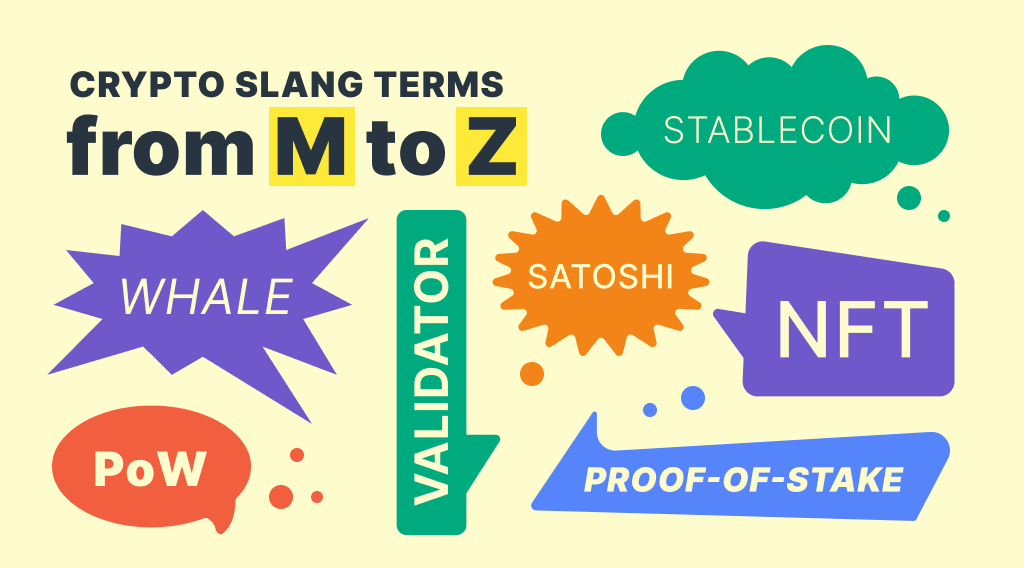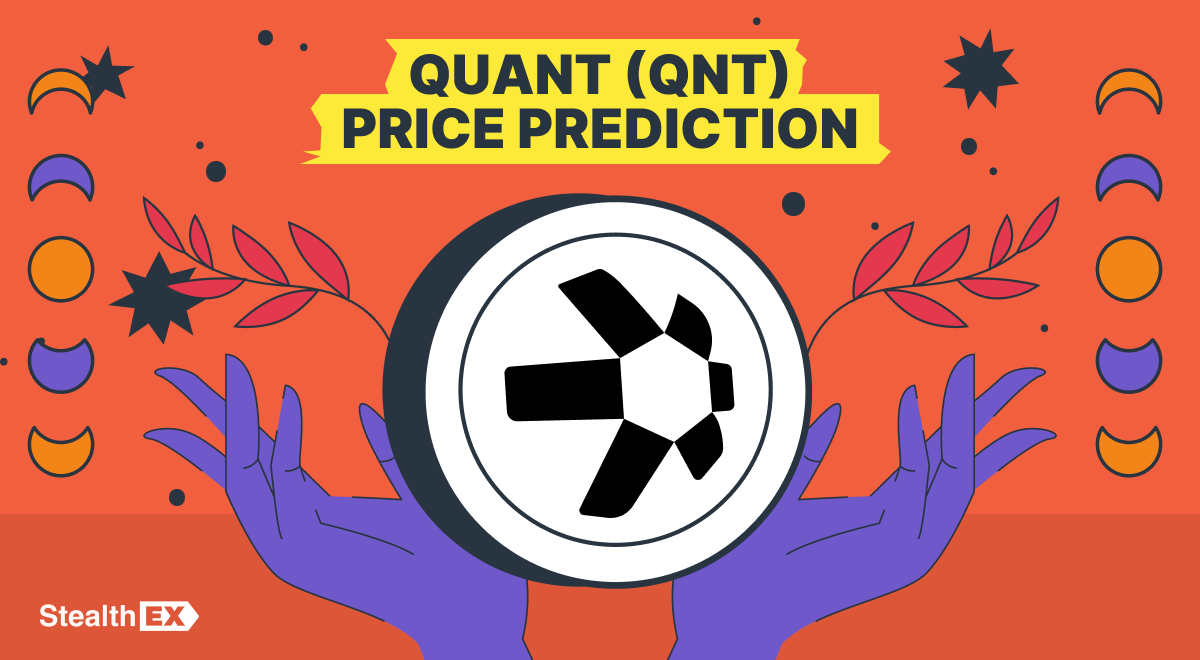A Guide to Popular Crypto Slang Terms, Part 2: from M to Z

This is our second article on crypto lingo and basic crypto terminology. In our previous articles, we covered a variety of animals in crypto investments. In this article, we’ll take a look at the most popular notions that will need some explaining. Here is our crypto slang terms list from M to Z. You can find the first part of the article with crypto jargon from A to L here.

Article contents
- 1 Crypto Slang Terms from M to Z
- 1.1 Meme Coins
- 1.2 NFA
- 1.3 NFT
- 1.4 No-coiner
- 1.5 Node
- 1.6 P2P
- 1.7 Proof-of-Stake (PoS)
- 1.8 Proof-of-Work (PoW)
- 1.9 Probably Nothing
- 1.10 Pump and Dump
- 1.11 Regulated
- 1.12 Rekt
- 1.13 Rug Pull
- 1.14 SAFU
- 1.15 Satoshi
- 1.16 Shill
- 1.17 Smart Contract
- 1.18 Stablecoin
- 1.19 To the Moon
- 1.20 Token
- 1.21 Validator
- 1.22 Vaporware
- 1.23 WAGMI/NGMI
- 1.24 Weak Hands
- 1.25 Wei
- 1.26 Wen Moon
- 1.27 Wen Lambo
- 1.28 Whale
- 1.29 Whitepaper
- 1.30 Zero Confirmation
Crypto Slang Terms from M to Z
Meme Coins
In essence, meme coins are cryptocurrencies inspired by memes (or funny images, videos and other forms of media) and Internet jokes. The two most popular meme coins are probably Dogecoin and Shiba Inu.
NFA
NFA stands for Non-Fungible Airdrops. NFAs aim to represent the true value of an airdrop reward when an initial DEX offering takes place. This is achieved through a model that’s not too dissimilar to a futures contract, an agreement to buy or sell assets that will be activated at a future date. The only difference is that the project owner releasing the NFA makes a promise to deliver the token or other digital assets on a future launch date. And as each airdrop winner ends up receiving different rewards under this model, there’s a one-of-a-kind gift that’s non-fungible.
NFT
Non-fungible tokens (NFTs) are cryptographic assets on a blockchain with unique identification codes and metadata that distinguish them from each other. Unlike cryptocurrencies, they cannot be traded or exchanged at equivalency. This differs from fungible tokens like cryptocurrencies, which are identical to each other and, therefore, can serve as a medium for commercial transactions. NFTs can represent real-world items like artwork and real estate.
No-coiner
A no-coiner is a person who’s against cryptocurrency and believes it’s going to fail. They don’t own any cryptocurrencies, often express negative opinions about the market, and tend to hold more traditional financial views.
Node
Nodes are an integral part of the blockchain to validate transactions and keep the network safe.
P2P
The term P2P refers to a peer-to-peer network exchange. Peer-to-peer is a direct exchange of crypto between parties without the involvement of a central authority. They may choose to swap cryptocurrencies for cryptocurrencies or crypto for cash.
Proof-of-Stake (PoS)
Proof-of-Stake is a type of consensus mechanism used to validate cryptocurrency transactions. With Proof-of-Stake, cryptocurrency owners validate block transactions based on the number of staked coins.
Proof-of-Work (PoW)
The Proof-of-Work consensus algorithm uses complex problems for miners to solve using high-powered computers, where a miner also receives compensation with coins.
Probably Nothing
This phrase is often used sarcastically and it’s used by crypto enthusiasts to say something is a big deal.
Pump and Dump
A type of scam, pump-and-dump schemes involve artificially inflating the price of an asset through false or misleading positive information. Typically, a group of people will buy large quantities of a particular asset at a low price all at once, driving up the demand and price of the respective asset. This sudden rise in price will then prompt others to jump in and buy too, and the original group will then sell (dump) the assets to turn a quick profit, leaving those who bought late often incurring heavy losses.
Regulated
The term is used in relation to cryptocurrency regulation. Massive inflows of capital could cause the prices of regulated cryptos to stabilize, attracting retail investors who haven’t taken the asset class seriously yet.
Rekt
In the crypto community, rekt (‘wrecked’) often refers to someone who has experienced a heavy financial loss due to a wrong trade or investment.
Rug Pull
A rug pull is a scam promotion of a crypto token via social media. After the price has been driven up, the scammer sells, and the price generally falls to zero.
SAFU
Secure Asset Fund for Users, or SAFU in short, is an initiative by Binance that takes a portion of trading fees and accumulates it in a fund. This fund will be used to compensate users if the need arises, i.e., if the platform is hacked or investors lose money through some technical exploit.
Satoshi
- Satoshi Nakamoto is the name used by the presumed pseudonymous person or persons who developed Bitcoin.
- Additionally, a Satoshi (SATS) is the smallest denomination of Bitcoin, equivalent to 100 millionth of a Bitcoin.
Shill
A shill is someone who publicly, actively, and maliciously promotes a cryptocurrency to inflate its value and lure new investors towards it.
Smart Contract
A smart contract is a self-executing contract (program) with the terms of the agreement between buyer and seller being directly written into lines of code.
Stablecoin
Stablecoin is a fixed-price cryptocurrency whose market value is attached to another stable asset. Commodity-backed stablecoins are collateralized using physical assets like precious metals, oil, and real estate. The most popular commodity to be collateralized is gold: Tether Gold (XAUT) and Paxos Gold (PAXG) are two of the most liquid gold-backed stablecoins. Other examples include Tether (USDT), USD Coin (USDC), Binance USD, and many more.
To the Moon
Investors who hope for a big increase in their cryptocurrency or other asset’s value will often use this phrase. Since the moon sits high in the sky, the term is a play on other terms such soaring prices, sky-high prices, etc.
Token
A crypto token is a virtual currency token or a denomination of a cryptocurrency. It represents a tradable asset or utility that resides on its own blockchain and allows the holder to use it for investment or economic purposes.
Validator
A blockchain validator is someone who is responsible for verifying transactions on a blockchain. Once transactions are verified, they are added to the distributed ledger. In Proof-of-Work (PoW) systems like Bitcoin, validators, also known as miners, solve complex computational math problems in order to win the right to verify transactions and receive rewards for what they are doing.
Vaporware
Vaporware describes protocols or dApps that provide solutions to non-existent or exaggerated problems. It often pitches decentralization as a key attribute of the solution. But often, decentralization only serves as a marketing ploy to make the product sound more appealing and innovative than it is in reality. In fact, vapourware means that the technology to deliver a grand project is not nearly developed enough to live up to the hype this project generates.
WAGMI/NGMI
WAGMI (or lowercase wagmi) stands for We are Gonna Make it. People say WAGMI to express comradery and support to their fellow crypto traders, friends, or social media followers. NGMI (or lowercase ngmi), on the other hand, stands for Not Gonna Make it. The crypto community uses NGMI as a way to make fun of, satirize, or ridicule people with negative crypto opinions, people who encourage poor investment choices, and people who fail to understand basic crypto concepts.
Weak Hands
Weak hands describe someone who sells their cryptocurrency at the first sign of falling prices. Those with weak hands usually lack conviction in their strategies and are easily spooked by negative news or price action of an asset.
Wei
Wei refers to the smallest denomination of Ethereum (ETH), the currency used on the Ethereum network.
Wen Moon
A distorted form of ‘When Moon?’ The phrase contains an inquiry as to when a certain coin’s value will skyrocket.
Wen Lambo
This term can be translated as When will you buy a Lamborghini? It’s a way to ask someone when they’ll get rich off of their crypto holdings, so rich that they’ll be able to buy an expensive car like a Lamborghini.
Whale
Crypto whales refer to large holders of cryptocurrencies. They can be individuals or organizations. While there is no official threshold to be considered a whale, the number of coins or tokens held needs to be significant enough to have an impact on market prices should holders buy or sell. Essentially, they have enough funds to manipulate the market. You can read more on whales, bears, and bulls in our article.
Whitepaper
A cryptocurrency whitepaper is a comprehensive document outlining the technical and economic aspects of a specific cryptocurrency.
Zero Confirmation
A zero confirmation or unconfirmed transaction is defined as an exchange that has not yet been recorded or verified on the blockchain.
This concludes Part 2 of the basic crypto slang terms. Reading about cryptocurrencies for a newbie can be confusing, but if you learn these terms, it’ll be way easier for you to navigate in the world of crypto.
If you are looking to buy crypto safely, you can always use the user-friendly and non-custodial StealthEX crypto exchange platform. You can purchase crypto privately and without the need to sign up for the service. Our crypto collection has more than 600 different coins and you can do wallet-to-wallet transfers instantly and problem-free.
Just go to StealthEX and follow these easy steps:
- Choose the pair and the amount you want to exchange. For instance, BTC to ETH.
- Press the “Start exchange” button.
- Provide the recipient address to transfer your crypto to.
- Process the transaction.
- Receive your crypto coins.

Follow us on Medium, Twitter, Telegram, YouTube, and Publish0x to stay updated about the latest news on StealthEX.io and the rest of the crypto world.
Don’t forget to do your own research before buying any crypto. The views and opinions expressed in this article are solely those of the author.
crypto NFT PoW Satoshi stablecoinRecent Articles on Cryptocurrency
 Crypto News: BBVA Backs Bitcoin, Iran Loses $90M, Senate Passes Crypto Bill
Crypto News: BBVA Backs Bitcoin, Iran Loses $90M, Senate Passes Crypto Bill  Quant Price Prediction: How High Can QNT Crypto Go?
Quant Price Prediction: How High Can QNT Crypto Go? 